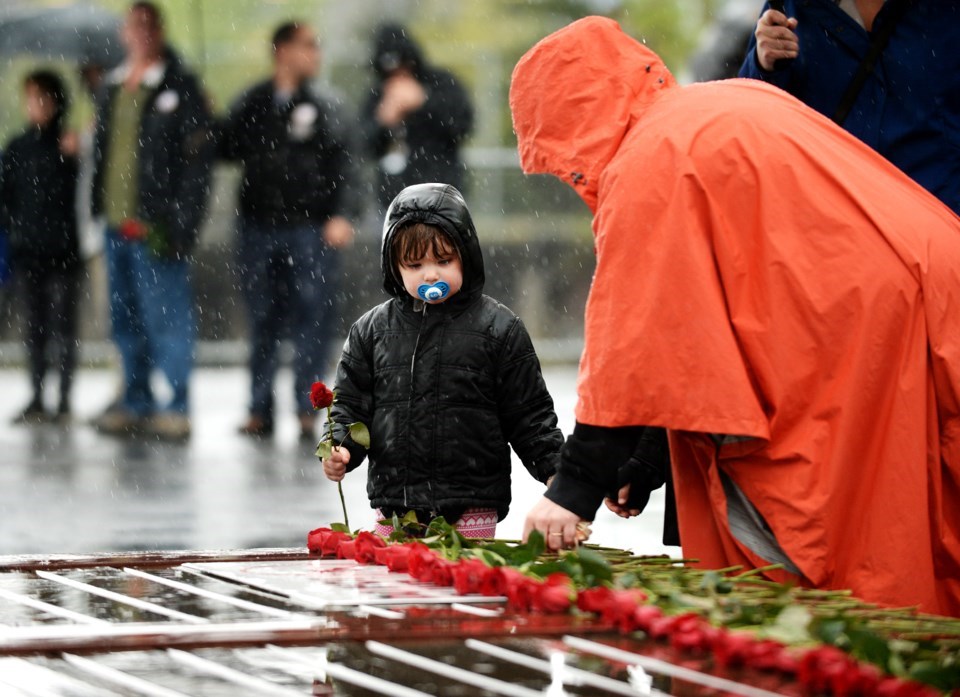The COVID-19 pandemic has highlighted has the challenges faced by workers in many sectors – from frontline workers who risk exposure to the virus to folks who are working at home.
The New Westminster and District Labour Council is calling on all employers and governments to learn lessons from the pandemic and ensure there’s a fair and healthy recovery for all workers. In the lead-up to the Day of Mourning For Workers Killed and Injured on the Job, commemorated annually on April 28, the labour council makes a presentation to city councils and school boards to promote workplace health and safety.
“Last year, we were not able to make these presentations as we were all coping with the radical changes brought to our workplaces, our communities and our lives by the onset of the COVID-19 pandemic,” NWDLC delegate Owen Goodwin told council April 26. “This year, as we mark the second Day of Mourning to take place under the pandemic, we are taking time to remember every worker killed or injured by COVID-19 in the workplace and every worker and family impacted by the pandemic, both at work and at home.”
Goodwin said the purpose of the Day of Mourning is twofold: to remember workers killed and injured on the job and to rededicate efforts to preventing future injuries through education.
“The pandemic has exposed the lack of protection for workers,” he told council. “Evidence from across the country, and indeed around the world, shows the virus is spreading at work, not only in health-care settings but also in factories, farm work, food processing, warehouses, schools, offices, transportation and other sectors. Workers have had to fight for access to protective equipment, COVID-safe practices at work, paid sick leave and respect for their basic health and safety rights.”
Goodwin said the pandemic’s impact on workers has taken many forms, such as frontline workers who have had to adjust to new or stronger health and safety protocols, including using masks and sanitizer in the workplace, or have had to work in new ways to protect themselves, as well as their patients, customers, coworkers and students.
“There is not one job or task that has been performed in the past year that has not been changed, sometimes drastically, in some way,” he said. “The burden of adjusting to the new reality, at times under enormous pressure or stress, has fallen on workers. Less visible, but also dangerous for its short-term effects and long-term effects, is the stress the pandemic has put on workers. Frontline workers face the stress of knowing that by going to work they risk of exposure to a deadly virus for themselves or their families.”
People who are working from home have also been impacted by the pandemic, Goodwin said.
“Those who are able to work from home are also coping with stress – balancing work and home life. The sudden transition to working from home has meant adjusting to a lack of equipment, lack of proper spaces dedicated to work, and lack of ergonomically appropriate work stations that protect against long-term impacts from repetitive strain, eye and other injuries,” he said. “Those living alone faced increased isolation.”
Goodwin said workers in some industries, including hospitality and tourism, have been hit hard and face stress related to under-employment or unemployment, as they may be struggling to pay their bills and support and feed their families.
“Women and workers of colour have been hardest hit by these closures, and must be a priority for our recovery. Stress and uncertainty have also led to a rise in domestic and intimate partner violence,” he said. “There is no doubt there will be long-term mental health impacts from isolation, stress and impacts of the pandemic.”
Goodwin said the labour movement is calling on employers and governments to learn from the pandemic.
“We are asking employers to work with health and safety committees and representatives to ensure safe and healthy working conditions, ensure all workers have access to free, personal protective equipment, training and paid sick days so they can stay at home when they are ill and not risk exposing co-workers and their community,” he said. “We are asking federal, provincial and territorial governments to ensure every worker has seamless access to universal, permanent and adequate paid sick leave, so no one has to choose between going to work sick and getting a paycheque. Being able to stay at home when you are sick is fundamental to reducing workplace exposures and illness.”
The New Westminster and District Labour Council is observing the Day of Mourning on Zoom on Wednesday, April 28 (today) at 7 p.m. Links to the event can be found on the labour council’s website and Facebook page. (You must sign up by 4 p.m.)
At Monday’s meeting, Mayor Jonathan Cote proclaimed April 28 as Day of Mourning in New Westminster.
“The last two years have not been normal years – not the normal years in terms of how we recognize this proclamation, but also not normal years for workers,” he said. “I think your words really highlighted the whole breadth of challenges workers have faced across our province and across the world in this past year.”
Cote said the pandemic has demonstrated the challenges and risks experienced by frontline workers.
“The Day of Mourning is important and needs to be important every year,” he said, “but, in this particular year, I think there’s a lot more for us to be focusing and recalibrating on.”
Follow Theresa McManus on Twitter @TheresaMcManus
Email [email protected]


